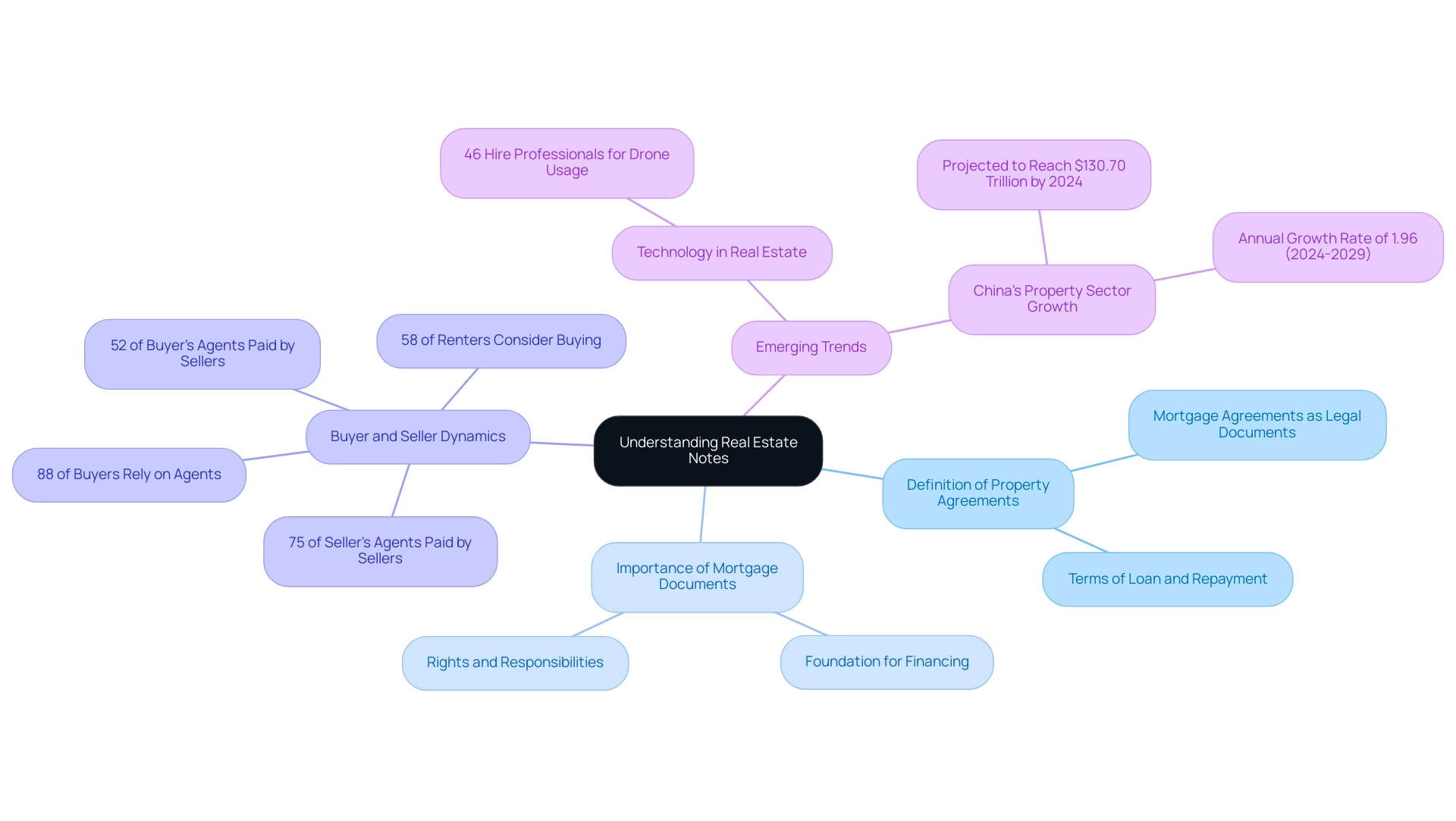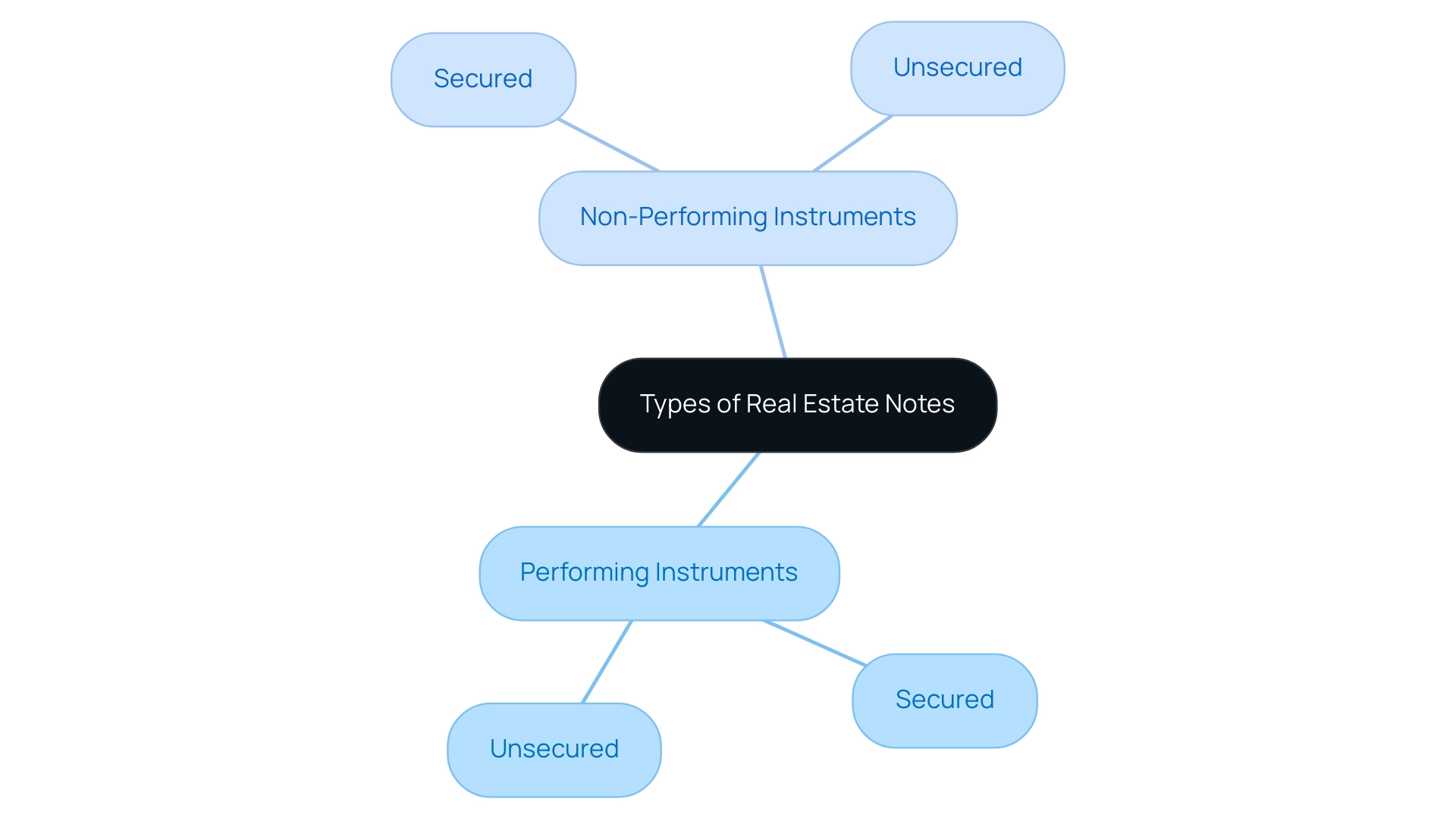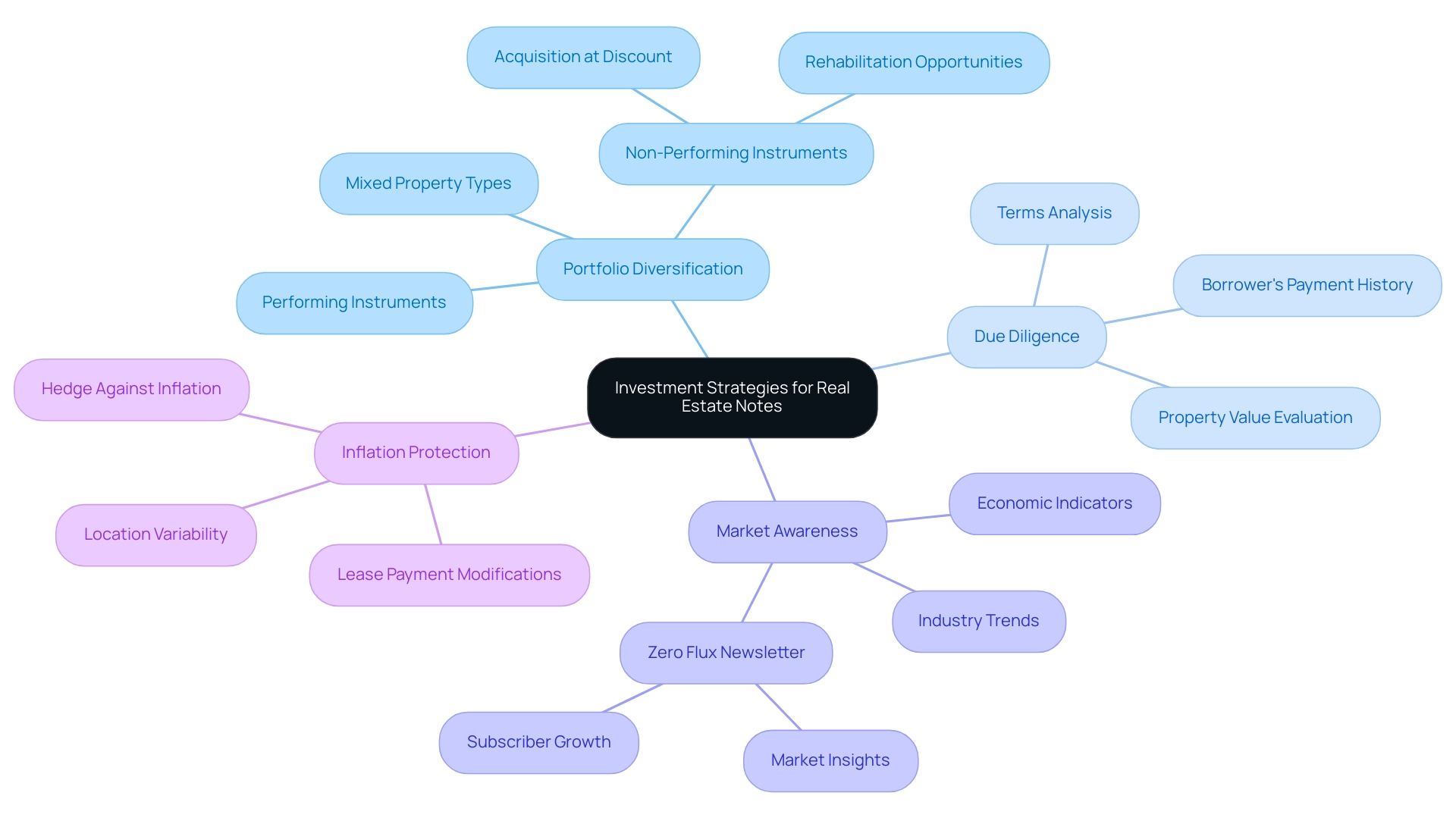Overview
Real estate notes serve as formal contracts that delineate the terms of a loan secured by physical property. They play a pivotal role in property transactions by offering financing options for buyers and creating investment opportunities for creditors. Understanding these documents is essential, as they significantly influence buyer-seller dynamics. The growing interest in mortgage investments is evidenced by current market trends and statistics, underscoring the importance of real estate notes in today's market landscape.
Introduction
In the intricate world of real estate investing, mortgage notes are pivotal instruments that often remain unnoticed. These legal documents not only delineate the terms of loans secured by property but also act as a vital link between buyers and lenders, facilitating property transactions while presenting lucrative investment opportunities. As the market continues to evolve, grasping the nuances of real estate notes becomes increasingly essential for both novice and seasoned investors. This article explores the diverse types of notes available, alongside the associated risks and strategies, delving into the multifaceted landscape of real estate note investing. By providing valuable insights, we empower investors to navigate this dynamic sector with confidence.
Understanding Real Estate Notes: Definition and Importance
Property agreements, commonly known as mortgage agreements, are essential legal documents that delineate the terms of a loan secured by physical assets. These documents represent a formal contract whereby the borrower commits to repaying the lender a specified amount, typically with interest, over a set duration. Their importance transcends mere paperwork; real estate notes serve as crucial financial instruments that enable property transactions.
By empowering buyers to finance their acquisitions, property agreements simultaneously provide creditors with a secured investment opportunity. The role of real estate notes in property investment is paramount. Current trends indicate a growing interest in mortgage investments, with 88% of home buyers relying on property agents as their primary source of information during their home search. This reliance underscores the necessity of understanding mortgage documents, as they encapsulate the rights and responsibilities of both parties engaged in a transaction.
Recent statistics reveal that 75% of seller's agents are compensated by the seller, while 52% of buyer's agents receive their remuneration from the same source. This dynamic highlights the financial implications of real estate notes in property agreements throughout negotiations and transactions. Furthermore, a notable 58% of tenants expressed interest in purchasing a home during their rental search, indicating a potential shift in dynamics that could influence the demand for real estate notes.
In light of contemporary practices, it is noteworthy that among members utilizing drones in their property business, 46% hire a professional, as reported by the National Association of REALTORS®. This illustrates the evolving landscape of property transactions and the significance of technology in the sector.
Case studies, such as the forecast for China's property sector, projected to reach $130.70 trillion by 2024, exemplify the increasing relevance of mortgage documents. The anticipated annual growth rate of 1.96% from 2024 to 2029 signifies a rising demand for luxury properties, further emphasizing the role of mortgage agreements in facilitating these high-value transactions. As the industry expands, the need for funding alternatives like real estate notes becomes increasingly critical.
In conclusion, understanding property documents is vital for anyone involved in property transactions. They not only provide a foundation for financing but also play a pivotal role in shaping the real estate market landscape.

Types of Real Estate Notes: Exploring the Options
Real estate notes can be classified into several distinct categories, each possessing unique characteristics and implications for investors. The primary categories consist of performing instruments and non-performing instruments. Performing loans are debts that borrowers repay on time, thereby providing a reliable stream of income.
In contrast, non-performing instruments arise when borrowers default, presenting a more complex investment scenario. Additionally, instruments can be categorized as secured or unsecured. Secured documents are backed by collateral—typically the property itself—which provides a layer of protection for the investor. Conversely, unsecured instruments lack this collateral, thereby increasing the risk associated with the investment.
Understanding these distinctions in real estate notes is vital for investors, as each type carries different risks and potential returns. For instance, performing loans generally yield steady income, making them appealing for those pursuing consistent cash flow. In contrast, real estate notes classified as non-performing loans may present opportunities for higher returns, particularly if the investor can successfully negotiate repayment terms or pursue foreclosure options.
Recent statistics indicate that household debt in the U.S. reached an astounding $18,036 billion in December 2024, accounting for 61.7% of the country's nominal GDP. This high level of debt underscores the significance of thorough research and due diligence in the financial sector, particularly considering the risks outlined in the case study titled 'Understanding the Risks,' which addresses borrower default, fraud, and the impact of interest rate fluctuations. By highlighting these risks, the case study demonstrates the importance for investors to remain alert and knowledgeable.
Investors should also be aware of the existing trends concerning performing versus non-performing real estate notes. As of 2025, the economic dynamics are evolving, with an increasing interest in both varieties of documents. Collaborating with trustworthy companies and utilizing expert insights can significantly enhance an investor's capacity to navigate these intricacies and make informed choices in the changing arena of real estate notes investment.
As Yieldstreet mentions, 'Our mission is to assist millions of individuals in generating $3 billion of income beyond the conventional public arenas by 2025,' emphasizing the potential of property loans as a feasible investment approach. Moreover, with over 30,000 subscribers, Zero Flux offers a reliable source of information, underscoring the importance of remaining informed in the property market.

Benefits of Real Estate Note Investing: Why Consider This Approach?
Investing in property agreements presents a multitude of benefits, particularly the potential for generating passive income, diversifying investment portfolios, and reducing management responsibilities compared to traditional property investments. Property loans typically yield steady cash flow through interest payments, appealing to investors who seek regular income without the complexities of property management. This potential for passive income is especially noteworthy in 2025, as the market continues to evolve, unveiling unique opportunities for wealth accumulation.
Moreover, these agreements are secured by property, which generally results in a lower risk profile compared to unsecured investments. This inherent security, combined with the prospect of consistent returns, makes property debt investing an attractive option for both novice and seasoned investors. As The Tired Landlord aptly noted, "I found it easier to manage when it was cookie cutter (a limiting idea when you think about it)," underscoring the appeal of streamlined management in investment.
Nevertheless, it is crucial to recognize the challenges linked to this investment path. While real estate investments can yield opportunities for passive income and diversification, they also carry risks, such as borrower default and the intricacies of legal and administrative processes. A case study titled "Challenges in Real Estate Notes Investing" illustrates that investors must carefully assess these potential risks against the rewards, ensuring they are adequately prepared for any challenges that may surface.
Recent dialogues within the financial community emphasize the increasing acknowledgment of debt investing as a viable strategy for passive income. Financial advisors assert that this investment approach not only provides distinct advantages over traditional investments but also aligns seamlessly with current market dynamics. With over 30,000 subscribers, Zero Flux serves as a dependable source for insights on real property financing, reinforcing the appealing nature of this strategy for individuals aiming to enhance their investment portfolios.
Risks Involved in Real Estate Note Investing: What You Need to Know
Real estate investment, particularly through real estate notes, offers substantial profit opportunities, but it also entails inherent risks that investors must navigate with care. A primary concern is borrower default, which arises when a borrower fails to make timely payments. Such a situation can escalate to foreclosure, jeopardizing the investor's return.
Recent statistics reveal that the charge-off rate for consumer loans was 4.86% in 1986; however, by 2025, the landscape has shifted. Inflationary pressures and rising consumer debt have begun to influence borrower behavior, making defaults increasingly likely.
Market fluctuations complicate this landscape further, as changes in property values can directly impact the security of real estate notes. For instance, a decline in the housing sector can diminish the collateral value of real estate notes, thereby increasing risk for investors. Additionally, legal complexities pose challenges, particularly during foreclosure proceedings, where a thorough understanding of local laws and regulations is crucial.
Marina Walsh, Vice President of Industry Analysis at MBA, notes, "While the labor sector remains relatively strong and often tracks with mortgage performance, some of today’s headwinds include inflationary pressures, lower personal savings rates, natural disasters, increasing consumer debt, higher tax and insurance payments, and higher debt-to-income ratios."
To mitigate these risks, thorough due diligence regarding real estate notes is paramount. Investors should assess the borrower's creditworthiness, scrutinize the property's condition, and evaluate the broader economic environment. Zero Flux emphasizes a commitment to data integrity and quality content, enhancing subscriber engagement and providing reliable insights for investors.
Expert insights suggest that a proactive approach to risk management can significantly enhance investment outcomes. Case studies indicate that investors who conduct comprehensive assessments are better positioned to weather market fluctuations and borrower defaults.
In 2025, the dangers linked to property investment remain significant. By staying informed about these dynamics and employing strategic risk management techniques, investors can make informed decisions that safeguard their investments against potential pitfalls.
Investment Strategies for Real Estate Notes: Maximizing Returns
To maximize returns in real estate notes investing, investors must adopt a multifaceted approach. One key strategy is portfolio diversification, which involves investing in various types of securities to mitigate risk. This can include a mix of performing and non-performing instruments, as well as real estate notes secured by different property types.
For instance, non-performing real estate notes can often be acquired at a discount, presenting a unique opportunity for investors to rehabilitate these assets and realize significant profits.
Conducting thorough due diligence is essential before purchasing any instruments. Investors should carefully examine the borrower's payment history, evaluate the property's present value, and analyze the terms of the real estate notes. This comprehensive examination aids in recognizing potential risks and opportunities, ensuring informed investment choices.
Staying aware of industry trends and economic indicators is another crucial aspect of successfully investing in real estate notes. For example, understanding that a mortgage is classified as non-performing after 90 days of missed payments can effectively guide investors in timing their purchases and rehabilitation efforts. Furthermore, utilizing resources such as the Zero Flux newsletter can provide investors with critical insights and trends, enhancing their decision-making process.
Additionally, property investments can serve as a safeguard against inflation through lease payment modifications, which is especially pertinent in today's economic environment. Statistics suggest that varied property debt portfolios can produce average returns that surpass conventional investments, particularly in inflationary conditions. By employing these strategies and understanding the purchasing process—such as using document marketplaces for real estate notes and partnering with brokers or funds—investors can significantly improve their chances for returns while navigating the complexities of the property market.

Buying and Selling Real Estate Notes: A Step-by-Step Guide
Engaging in the purchasing and trading of real estate notes necessitates a systematic approach, encompassing several critical steps. Initially, investors should identify potential instruments for acquisition, which can be sourced from banks, brokers, or specialized online marketplaces. Once a promising opportunity is located, conducting thorough due diligence becomes essential. This process involves assessing the document's value and evaluating the borrower's creditworthiness to ensure a sound investment.
Upon completing this evaluation, the investor can negotiate the purchase price, followed by finalizing the transaction through appropriate legal documentation. This meticulous process not only safeguards the investor's interests but also enhances the likelihood of a successful investment.
When it comes to selling a financial instrument, the process mirrors that of purchasing. The seller must prepare all necessary documentation, efficiently promote the document to attract potential buyers, and negotiate favorable terms. Understanding these steps is crucial for anyone aiming to navigate the financial landscape successfully.
Statistics indicate that approximately 30% of purchasers are increasingly drawn to eco-friendly features, which can also pertain to real estate notes that promote sustainable investments. This trend underscores the importance of aligning investment strategies with current market preferences. Additionally, case studies reveal that properties located in master-planned communities, often featuring shared amenities, tend to attract buyers seeking a cohesive living environment. This highlights the potential for increased demand and value in such investments.
Expert advice emphasizes the importance of acquiring documents from reputable banks and brokers, as this can significantly influence the quality and profitability of the investment. As noted by Realtor.com, properties situated near parks frequently sell more rapidly and at elevated prices due to their appeal to families and outdoor enthusiasts—this factor can also affect the attractiveness of real estate notes associated with these properties. By adhering to these organized steps and leveraging industry insights, investors can adeptly participate in the acquisition and disposal of property agreements, positioning themselves for success in this dynamic sector.
Due Diligence in Real Estate Note Investing: Key Considerations
Thorough investigation is crucial in property investment, requiring a meticulous assessment of various key aspects prior to fund allocation. Investors must prioritize evaluating the borrower's creditworthiness, often reflected in average credit scores that can vary significantly across different sectors. For example, understanding the typical credit score of borrowers in real estate notes provides valuable insights into the associated risk profile of specific investments.
In addition to borrower evaluation, a comprehensive examination of the property's condition and value is imperative. This includes analyzing local economic trends, which can indicate potential appreciation or depreciation in property values, thereby impacting the safety of the investment. Recent developments, such as Fairfax County's decisions regarding workforce housing policies, underscore the necessity of grasping local dynamics that influence housing accessibility and, consequently, investment viability.
These decisions are pivotal as they can shape market conditions and affect investor confidence.
Investors should also meticulously scrutinize any existing liens or encumbrances on the property, as these can substantially affect the investment's risk profile. Legal due diligence is equally essential; ensuring all documentation is accurate and that the transaction complies with relevant regulations safeguards investors against unforeseen liabilities. Insights from property lawyers emphasize the importance of understanding legal factors in transaction agreements, which can mitigate potential conflicts.
Experts assert that mastering due diligence in property funds not only safeguards capital but also unveils opportunities for long-term success in alternative investments. As Douglas A. Praw notes, "While observations offer a degree of diversification, they are still affected by wider economic trends." By conducting thorough due diligence and incorporating feedback from over 40,000 clients who rely on Concrete, investors can effectively minimize risks and make informed decisions, ultimately enhancing their investment outcomes in the evolving landscape of property financing.
Market Trends Impacting Real Estate Notes: Staying Informed
Market trends significantly influence the performance of property agreements, with key factors such as interest rates, economic growth, and housing market dynamics playing a crucial role. For instance, as interest rates rise, borrowing costs increase, adversely affecting borrowers' repayment capabilities. This scenario is particularly critical in 2025, where the average transaction price of new housing in Austria is 4.92 EUR per square meter, reflecting broader economic conditions that can impact property values.
Moreover, fluctuations in the housing market—such as variations in property values and shifts in demand—directly affect the security of the underlying assets linked to real estate notes. The Pending Home Sales Snapshot illustrates this point by providing timely data on pending sales, enabling real estate professionals to effectively gauge current conditions and buyer activity. This aligns with Zero Flux's commitment to quality content, enhancing subscriber engagement by delivering relevant insights that inform investment strategies.
Investors must remain vigilant regarding these trends through consistent analysis and reporting. This proactive approach empowers them to adapt their investment strategies in response to evolving conditions. As noted by John Sim, Head of Securitized Products Research at J.P. Morgan, "It’s evident that numerous aspects of Trump's policy will influence the housing sector."
The ramifications of such policies, particularly concerning labor supply in the construction sector, can have intricate impacts on the housing market and, consequently, on property documents. Staying informed about these developments is essential for making sound investment decisions regarding real estate notes.
Conclusion
Grasping the intricacies of real estate note investing is crucial for navigating this dynamic and potentially lucrative market. This article underscores the pivotal role of mortgage notes in property transactions, highlighting their significance as both financial instruments and investment opportunities. With an increasing interest in various types of notes—such as performing and non-performing notes—investors must be well-informed about their unique characteristics, risks, and potential returns.
The advantages of real estate note investing, including passive income generation and portfolio diversification, are emphasized, alongside the inherent challenges such as borrower defaults and market fluctuations. By employing strategic investment approaches, conducting thorough due diligence, and staying attuned to market trends, investors can effectively mitigate risks and enhance their chances of success.
Ultimately, the evolving landscape of real estate note investing presents a compelling opportunity for both novice and seasoned investors. By leveraging the insights provided, individuals can make informed decisions that align with their investment goals, ensuring they are well-prepared to navigate the complexities of this sector. As the market continues to evolve, remaining informed and adaptable will be key to maximizing returns and achieving long-term success in real estate note investing.




